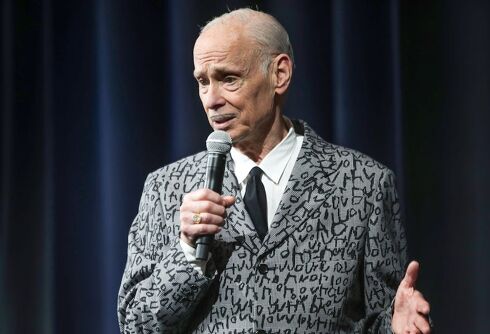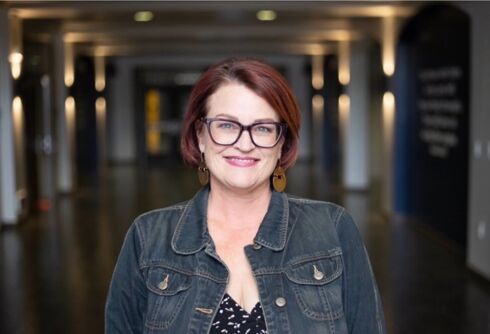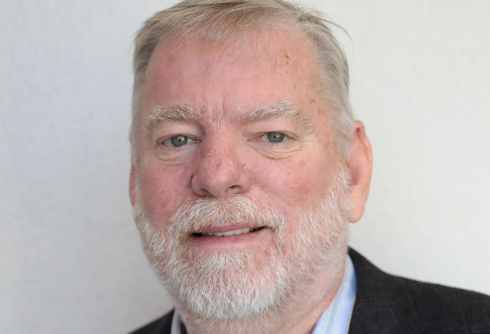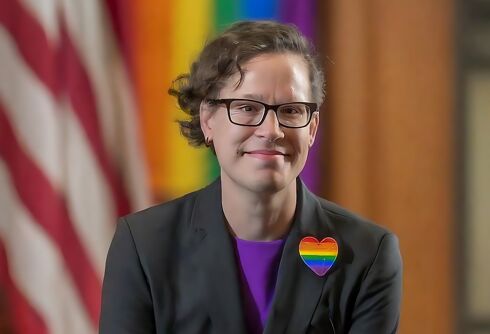On May 16 2023, in a ruling contrasting with the growing anti-LGBTQ+ sentiment across Africa, Namibia’s Supreme Court recognized same-sex marriages contracted abroad between Namibian citizens and foreign spouses. This ruling – the culmination of a harrowing six-year legal battle for the couples involved – was received as a significant victory for Namibia’s LGBTQ+ community, raising hopes for further steps towards full equality.
While Namibia doesn’t explicitly ban homosexuality, “sodomy” is criminalized under a colonial-era law. But the country’s LGBTQ+ community has become increasingly visible since 2019, when a series of court cases on queer people’s rights to marry, start a family, and live and work in the country freely came into the public light, challenging what campaigners call “State-sanctioned homophobia.”
Related:
LGBTQ+ rights are entwined with the fight for democracy in Myanmar
A collaboration between straight and LGBTQ+ activists is causing a rapid shift in attitudes toward LGBTQ+ people.
Public protests, court hearings, and Pride parades have encouraged the birth of a new generation of activists and campaigners who use visibility as one of their most powerful tools. Vibrant monthly drag nights have popped up in Windhoek, the capital, and young campaigners have stepped into the limelight at home and internationally to advocate for queer rights in Namibia and across the continent.
Omar van Reenen is one of them. The 26-year-old co-founder of EqualNamibia has been a central voice for the movement, even recently bringing its message to an audience of thousands at the Berlin Pride Parade.
Van Reenen grew up rarely seeing any stories about other queer people, but they tell LGBTQ Nation that, “If 6-year-old Omar opened a newspaper today, they would read about drag nights, drag queens taking up space, organizations fighting for intersectional visibility of queer women, lesbian voices… That empowers queer people to know that there’s nothing dehumanizing or undignified about you: that you belong in this country.”
South African Daniel Digashu, on the other hand, was pushed to become something of an “accidental activist” when the Namibian Ministry of Home Affairs and Immigration refused to grant him a spousal residency visa, despite his now eight-year marriage with Namibian Johann Potgieter. The couple’s case was filed in 2017 and, along with German-Namibian couple Anita and Anette Seiler-Lilles, ended with the victorious Supreme Court verdict in 2023. Seeing and experiencing firsthand the toll that the legal battles took on his own and other litigants’ mental health prompted Digashu to start studying psychology and dive deeper into LGBTQ+ rights in the region.
The ruling hasn’t come without backlash, however: Attacks on queer Namibians have risen, along with aggressive homophobic discourse. In July, the National Assembly passed a bill contradicting the Supreme Court decision and defining a spouse exclusively as “one half of a legal union between a genetically born man and a genetically born woman of the opposite sex”.
Photojournalist Chris de Beer-Procter has chronicled the evolution of Namibia’s LGBTQ+ movement since 2021, between protests, victories, losses and agonizing waits. This is an intimate look at the experiences of two activists fighting for their rights to live and love in Namibia.

May 20, 2021: Campaigners and allies march to the High Court in Windhoek, Namibia’s capital, in support of married couples Daniel Digashu & Johann Potgieter and Anita & Anette Seiler-Lilles’ case appealing for recognition of their same-sex marriages at the country’s High Court. The two couples’ cases were combined due to their similarity and were heard together in both the High Court and later in the Supreme Court on March 3, 2023.
Although a 2019-2020 study ranked Namibia as the third most tolerant of homosexuality in Africa, anal sex between men remains illegal, if rarely enforced, under a colonial-era “sodomy law.” Namibia’s post-independence Constitution is remarkably liberal, but queer activists were “silenced and erased” from the post-independence process, explained 26-year-old activist Omar van Reenen.
Photo by Chris de Beer-Procter

May 20, 2021: Namibia’s LGBTQ+ community has taken steps to reclaim terms that traditionally carry derogatory meanings. Slogans such as “Omashenge Ovanhu” (“queers are people” in Oshiwambo) or the Afrikaans term “ ‘’n moffie is ook ‘n mens” (literally “a f*g is also a person”) emphasize queerness as legitimately African.
“We are more visible than ever, and they will never be able to push us back into the closet. Not again,” says 26-year-old activist Omar van Reenen.
Namibia’s first Pride parade, held in 2013 in the township of Katutura, included about 100 people. Bolstered by the court cases, the 2021 Pride was the biggest in the country’s history.
The May 2023 Supreme Court ruling on foreign same-sex marriages was an historic victory for the community, but it also brought an unexpectedly violent backlash. While President Hage Geingob hasn’t explicitly criticized the ruling, many members of his party, Swapo, pushed for a bill explicitly defining the term “spouse” in order to rule out same-sex marriage.
Photo by Chris de Beer-Procter

May 28, 2023: Activist Omar van Reenen poses in a street in their home town, which was named after their grandfather, Harry van Reenen.
Omar grew up in Narraville, a neighborhood of the coastal city of Walvis Bay that was historically reserved for “Coloured” people – a racial category established by the Apartheid government in South Africa to designate a mixed-race group descending from aboriginal communities and slaves brought mainly from South-East Asia.
Omar’s grandfather founded the first hotel for Coloured people, which became a meeting place for the liberation struggle.
Photo by Chris de Beer-Procter

May 28, 2023: Omar van Reenen with their grandmother in the family home in Narraville, Walvis Bay.
Van Reenen’s commitment to the fight for queer rights is intimately linked to their grandfather’s history in the liberation movement.
“Growing up queer in Namibia made me realize that LGBTQ+ rights are the civil rights issue of our generation, just like racial justice and ending Apartheid were the civil rights issues of my parents and my grandparents’ generation,” they say.
“We were always told we were the ‘born free generation’. But if I am born free, I should be free to love who I want to love, to express my gender and sexuality in any way.”
Photo by Chris de Beer-Procter

May 28, 2023: Omar van Reenen poses in front of a portrait of their grandfather (left) and their high school jersey which is adorned with prizes, in their family home.
“Watch out for this kid, he will be President someday,” Harry van Reenen used to say about his grandchild. Van Reenen was active in student councils and movements from childhood.
In 2015, they received a scholarship to study in the United States. “I saw that as my ticket out,” they say: “Up until then, I tried everything to suppress my gender expression, I had not told anyone I was gay. Now for the first time in my life, I could be an authentic leader and student activist and fight for other people while also being my true self.”
Photo by Chris de Beer-Procter

May 28, 2023: Political posters and keepsakes from Omar’s time studying in the USA adorn their work desk in their bedroom. The experience heavily influenced their activism today.
They didn’t come home once during the five years of their studies, but they felt “hypocritical.”
“Here I was, fighting for Black Americans, for undocumented students, for women’s rights and gay rights in America. But in my own country, the queer community is still far behind.”
Photo by Chris de Beer-Procter

May 20, 2021: As the co-founder of the NGO EqualNamibia, Omar van Reenen leads a protest march towards the High Court in support of the Digashu-Seiler-Lilles case.
The organization was started in 2021 and was inspired by the struggle of married couple Philip and Guillermo Lühl-Delgado, who sued the Namibian Ministry of Home Affairs and Immigration for refusing to grant citizenship to their three children, who were born through surrogacy in South Africa.
When their two youngest, then-newborn twins Paula and Maya, were denied entry into the country, the couple reached out to van Reenen, who became involved in their campaign online. “I realized: ‘Wow, there are actually gay couples living in Namibia, married and wanting to start a family!’ It showed me that I should come back home and continue the work back in Namibia,” Omar remembers.
With the slogan, “Bring Paula and Maya Home”, the campaign gained much traction. On March 21st, 2021 – Namibia’s Independence Day – Omar officially co-founded Equal Namibia “to breathe life into the promise of equality that this country was founded on.”

Two years later, as Equal Namibia and van Reenen have become influential forces in the movement, Omar embraces Guillermo outside the Supreme Court where they have gathered supporters for the couple’s case. On March 20, 2023, the Supreme Court ruled against the couple, denying their eldest son Yona of Namibian citizenship. In 2023, after years of exhausting battles, the family made the difficult decision to relocate to Guillermo’s home country of Mexico.
Photos by Chris de Beer-Procter

May 28, 2023: Omar van Reenen pages through various media clippings related to LGBTQ+ rights in Namibia in their family home in Walvis Bay.
They collect all articles chronicling the movement, in hopes of one day establishing a queer museum in Namibia. “I want to ensure that history knows Namibia is more equal because queer people made sure of it,” they say.
Photo by Chris de Beer-Procter

May 20, 2021: Married couples Daniel Digashu & Johann Potgieter and Anita & Anette Seiler-Lilles pose for a media photograph before their hearing in the High Court. They appealed to the government to recognize their same-sex marriages, which were legally conducted abroad. They argued they therefore had the legal right to live and work in Namibia.
The case was one of the most significant in galvanizing the queer & ally community, as well as sparking backlash from church groups and anti-LGBTQ+ political forces.
On May 16, 2023, the Supreme Court finally ruled in their favor, therefore recognizing their foreign marriages. Yet what should have been a relief after six years of battles was tainted by the violent homophobic reactions in the political and public spheres.
Photo by Chris de Beer-Procter



March 8, 2023: South African Daniel Digashu poses with his Namibian husband Johann Potgieter and their son Lucas on their farm only a few days after their case was heard in the country’s Supreme Court.
The couple were married in 2015 in neighboring South Africa, which is still the only country on the African continent where same-sex marriage is legal. Their legal troubles started when the couple decided to move their family to Namibia in order to be closer to Potgieter’s family.
Photos by Chris de Beer-Procter

March 7, 2023: Lucas walks along one of their wildlife camps with his father, Potgieter.
“It’s always been our biggest dream to live on a farm,” says Digashu. Johann wanted his son to grow up in the bush and enjoy the same childhood that defined him. But the Ministry of Home Affairs and Immigration rejected Digashu’s applications for both work and spousal residency.
“We felt they were trying to break our family apart, without any valid reason,” says Digashu. “I felt forced to take a stand, because who else was going to?”
Photo by Chris de Beer-Procter

March 9, 2023: Lucas and Potgieter are emotional while saying goodbye to Digashu as he departs for South Africa for a few weeks.
Digashu was allowed to remain in Namibia while the court case and appeals were ongoing, but the family lived in constant stress of a negative verdict, as well as the sporadic and traumatic incidents which sometimes marked Digashu’s entries into the country.
“My biggest fear was to live separately from my family, that I would have to leave the country,” remembers Digashu. “For the past six years, I’ve had to live my life as a tourist, with the limitations of a visitor visa.”
Photo by Chris de Beer-Proctor



May 26, 2023: Daniel Digashu reads through the victorious Supreme Court judgement at the family’s home, located a few hours outside of the country’s capital city of Windhoek.
The Supreme Court’s ruling came surprisingly quick: Most of the litigants couldn’t even attend court. “We were expecting to get the worst phone call in our lives,” Digashu remembers. “Then my husband looked at his phone, looked up at me and said, ‘Appeal upheld, we won.’” I was in such disbelief, I completely froze.”
The victorious Supreme Court ruling is “a great tool to carry the movement towards a more free Namibia,” Digashu believes. For his family, he says, it means “everything.”
“We can travel without the fear of being questioned and treated like zoo animals, we can continue living our lives, contribute to society… Freedom, at last!”
Photos by Chris de Beer-Proctor

May 25, 2023: Daniel Digashu readies himself to give an online talk about fighting state-sanctioned homophobia and its effects on mental health. He now works as a consultant with the Southern Africa Litigation Centre (SALC) to help support other litigants while he pursues his degree in psychology.
“The daily internal battles of not being certain of your future, the long waits when most of [the litigants] are young people who want to continue their careers and flourish… This has been traumatic for all of us,” he says.
Digashu’s work with SALC has pushed him to become more active within the wider African LGBTQ+ struggle, and he hopes the ruling will at least provide a “glimmer of light” for the African continent.
Just two weeks after Namibia’s Supreme Court ruling, the Ugandan President signed into law one of the world’s harshest anti-gay bills.
“People say homosexuality is not African – but how can it be true when I’m standing here?” Digashu says.
Photo by Chris de Beer-Proctor

May 31, 2023: Daniel and Johann Potgieter embrace after a long day of work on the farm.
While the Supreme Court ruling should have meant relief and freedom for their families, the litigants have had to face increasing backlash fueled by Christian church groups. The ruling party, SWAPO, has passed a bill explicitly defining the term “spouse” so as to rule out any possibility of same-sex marriage for Namibians.
“Recently when I got back to Namibia from South Africa, I got a visitor’s visa stamped on my passport and was referred to the Ministry of Home Affairs to go sort it out with them; a direct and clear disregard of the recent Supreme Court ruling,” Digashu recently said in a SALC press release.
Yet the family remains hopeful that the Supreme Court’s ruling will be respected in line with the Constitution and that the “moral panic” will eventually die down, leaving more space for Namibia’s LGBTQ+ community to flourish.
“I truly believe that we made a mark. We have made history,” Digashu laughs. “I just sometimes have to remind myself that I was a part of it.”
Photo by Chris de Beer-Proctor
















